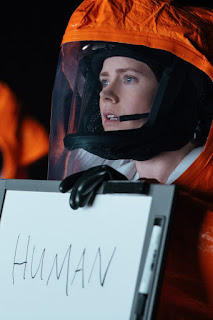What will you do if you get to know your future in advance? Will you change it or will you live with it? But life is not always a bed of roses, there would be thorns in between. Most of us would try to amend or alter the unhappy events that are supposed to happen, provided we know our future. Even so, are you sure that things would change? What if the amendments that we make would eventually lead to an unhappy situation that was supposed to occur in the first place? It takes a lot of courage and perseverance to lead your life without making any alterations even when you know what is about to happen. This is what the movie Arrival tells us.
In the movie directed by Denis Villeneuve, the beautiful Amy Adams becomes the center of attention with her expressive eyes and exceptional acting. This Sci-fi movie revolves around a dozen of extraterrestrial spacecraft that silently appeared and started hovering over disparate locations around the Earth. Adams plays the role of Dr.Louise Banks who is a linguist enlisted by the United States Army to discover the purpose of aliens by communicating with them before tensions lead to war. Dr. Banks along with physicist Ian Donnelly (Jeremy Renner) goes to study the craft above Montana.
As the story unfolds and with the developments made by Louise and Ian in communication with the Aliens, she starts to get flashback-like visions of her daughter. But with the progression, the movie reveals that her visions are actually premonitions about the daughter who will be born sometime in the future. Confirming the Sapir–Whorf hypothesis that a language shapes the fundamental brain cognition of those who speak it, those who master the aliens’ language are able to perceive the future and past, Louise accomplishes the task thrust upon her.
As the spacecraft leaves Earth peacefully conveying the intended message Louise is completely aware of her future. She knows what will happen to herself and her daughter. Yet she embraces her future. She marries the man and conceives her daughter at the time it was supposed to happen. She never tries to alter or prevent anything. She enjoys every moment with her daughter and partner even when she knew what is in store for her. She accepts and welcomes every single thing that came her way as expected. The Oscar-nominated Adams did a beautiful job by bringing out Dr. Louise to life on the screen. The perpetual sadness and loneliness that engulfs Louise are portrayed at its best by Adams. The sequence and glimpses of her future life with Max Ritcher's 'On the Nature of Daylight' in the background set the melancholic tone of the events, intensifying the wrenching pain that forms in our hearts at the sight of Louise's fate.
We, as humans are desperate to know our future. We seek every way to alter our past and future. But unfortunately, our perception of time is linear. Yet we constantly try to know everything beforehand and change things in order to lead a happy and perfect life to avoid ending up lonely, loveless, and poor. Even if we are given the ability to know our future with the help of some extraterrestrial beings as in the movie, how many Louises can be found? How many of us would embrace our life as it comes? And most importantly, even if we make changes, will our lives be perfect? Will our lives be perfect without a mixture of sorrow and happiness in it? It is something to ponder over. Because ultimately everything in our lives happens for a reason, to tread through thorns, to stand up after every fall, to become the oasis in the desert, to find the light at the end of the dark tunnel, and to enjoy our little time on Earth in every possible way.
Arrival is indeed like a beautiful poem, which causes pain in you every time you watch it. It is a Sci-fi movie with deep implications on our language and life. While we live and grow old with an urge to know about the very next moment of our life, the movie asks us to embrace life as it comes and makes every moment of it worth living.




Comments
Post a Comment